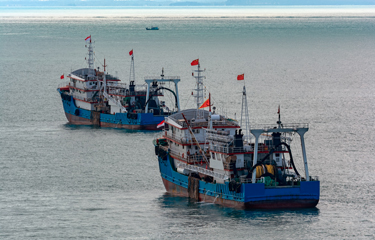Greenpeace USA, AFL-CIO, Human Rights Watch, Environmental Justice Foundation, Whole Foods Market, and 19 other groups have sent a letter to the U.S. Department of Labor requesting the organization end its practice of only considering a country’s territorial waters when creating its List of Goods Produced by Child Labor or Forced Labor.
The letter, sent to Marcia Eugenio – the director of the Office of Child Labor, Forced Labor, and Human Trafficking for the Bureau of International Affairs with the Department of Labor – comes in the wake of a damning report by Greenpeace identifying forced labor issues in Southeast Asia. The new report includes accusations of forced labor against 13 distant-water fishing vessels registered in China, Taiwan, Vanuatu, and Fiji.
The bureau regularly creates its list of goods, which is used in its report to Congress. However, that list currently only includes seafood harvested inside a exclusive economic zone, and does not include seafood harvested on distant-water vessels.
That lack of listing, the signed letter states, leaves a gap that should be closed by the department.
“This practice effectively excludes distant water fishing nations with significant incidence of forced labor on the high seas from your biennial report to Congress and the public,” the letter states, addressed to the department. “We call on you to fully consider the ramifications of this position on forced labor in the fisheries sector, declare an official policy of attributing high seas catch to the flag state, and remove all seafood exemptions in the 2020 report.”
The list, according to Greenpeace Senior Oceans Adviser Andy Shen, should fully encompass the seafood industry in order to bring human rights abuses to light.
“As evidenced in Greenpeace Southeast Asia’s new report, Seabound, there are still disturbing and unreported incidents of forced labor happening throughout the high seas. The United States, as one of the largest markets in the world for imported seafood, has the responsibility to do everything in its power to ensure U.S. businesses are not profiting from modern slavery at sea and that millions of Americans are not unwittingly supporting the cruel exploitation of workers in the seafood industry,” Shen said. “ILAB’s practice of exempting seafood caught on the high seas excludes some of the most egregious human rights abuses in the world and leaves Congress and the public with an incomplete picture as to which countries are exploiting workers to maximize corporate profits.”
The list, according to the letter, has made “a significant contribution to reducing forced labor across many sectors.” Not including distant-water fishing vessels in its report on forced labor is letting companies engaged in the practice off the hook. In addition, the reasoning the department uses when excluding distant-water fishing vessels in the list contradicts international law.
“ILAB’s practice of considering high seas catch as attributable to no single country is confounding as it is inconsistent with international law, including several provisions of the U.N. Convention on the Law of the Sea – which the U.S. has agreed reflects customary international law – and the U.N. Fish Stocks Agreement to which the U.S. is a party,” the letter states. “Moreover, it also conflicts with the current policy and practice of the U.S. Department of State and the National Oceanic and Atmospheric Administration, two U.S. agencies that represent U.S. interests at the U.N. and select regional fisheries management organizations (RFMOs).”
The 24 signatories are, therefore, requesting that the department of labor include distant-water fishing in its next list.
“ILAB should immediately change its position to ensure that elected officials and the public know about the high risk of forced labor in some of the most common seafood sold in our supermarkets, cafeterias, and restaurants,” Shen said. “It is time for ILAB to demonstrate leadership on this issue and rectify past mistakes by truly fighting forced labor and illegal fishing in the global fishing industry.”
Photo courtesy of Igor Grochev/Shutterstock







